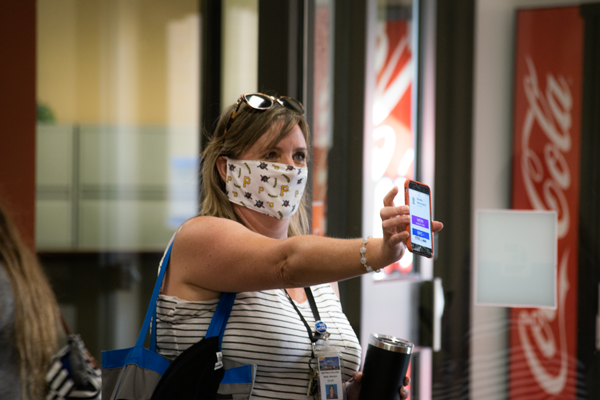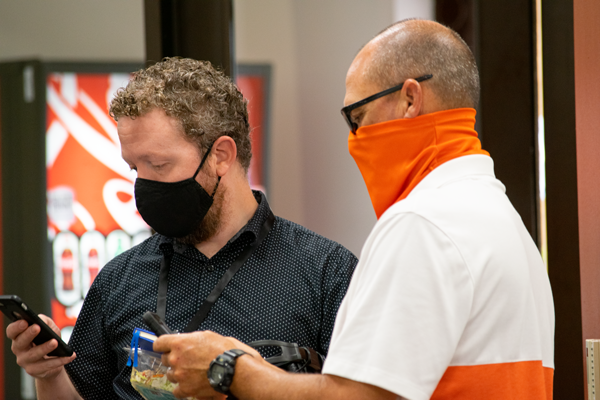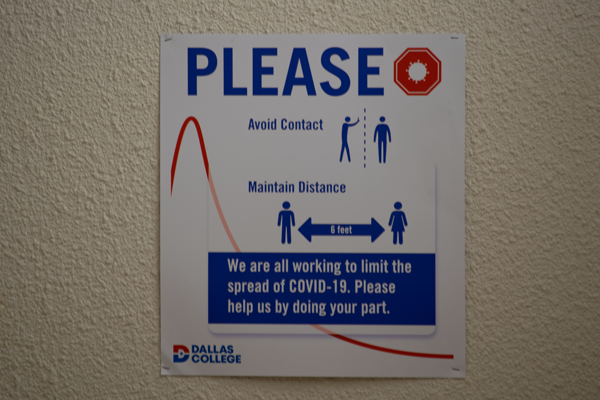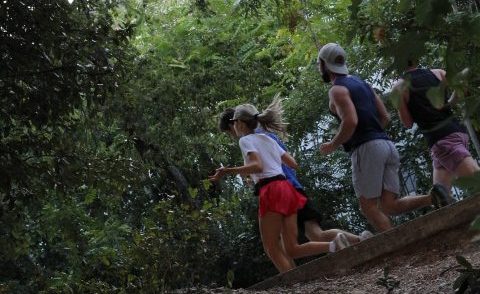
By HARRIET RAMOS
Dallas College students now have the option of going to campus for in-person tutoring and library services.
Campuses have been closed since March 16 due to COVID-19. Fall classes are primarily online except for those that contain a hands-on component such as the Career and Technical Education courses, nursing and dance.
According to the Dallas College website, students in need of tutoring or library services must make an appointment 72 hours ahead of time at dcccd.libcal.com. Sessions will last for one to two hours and are available Monday through Friday 8 a.m.- 5 p.m. Walk-ins are not allowed.
The subjects available for face-to-face tutoring at Eastfield are algebra, developmental math, government, history, philosophy, speech and writing. Online tutoring is still available for other subjects.
Tutoring coordinator Anand Upadhyaya said that as of Saturday, no one had signed up for an in-person tutoring session.
“The library will be providing computer access and a few individual study spaces,” said Executive Dean Karla Greer, who oversees library operations.. “We will not provide other services that involve high-touch surfaces or close physical proximity such as printing or copying, over-the-shoulder computer assistance or resource check out at this time.”
The return of in-person tutoring and library services on Aug. 31 are the latest in Dallas College’s phased approach to reopening.
The college’s back to campus plan and guidelines are posted at
dcccd.edu/backtocampus.
A majority of staff returned to campus Aug. 3 on a rotating schedule of one week on campus and two weeks at home. Employees who are in the high-risk category are still working remotely, as are most faculty.

Nancy Abdo, Eastfield’s back to campus coordinator over the summer, said employees had to be on campus to assist students who needed to enroll or register for classes and didn’t have the technology to do it online.
“I think that bringing more people back onto campus of course is going to increase the risk of illness,” she said. “But … we want the students to get the services they need.”
Abdo said she encourages employees who are at high risk or live with someone who is to fill out the Inability to Return to Workplace form that would allow them to keep working remotely.
For those who do not have the option of working remotely, Abdo reminds them to keep practicing their own safety by wearing masks, washing their hands and social distancing.
Employees and students are required to use the self-reporting tool on the Dallas College website if they test positive or are exposed to the coronavirus.
A total of 12 positive cases were reported on Dallas College campuses in the last 30 days, according to the college’s website. One of those was at Eastfield.
There were 398 new coronavirus cases reported for Dallas County on Sept. 5 according to the Dallas County Health and Human Services, though 151 of these were from individuals tested in August. The number of cases peaked in July with daily counts over 1,000 for a period of about two weeks.
There have been a total 944 COVID-19 related deaths in Dallas County as of Sept. 5.
Employees and students who have face-to-face classes have to fill out the Appian health screening app prior to coming on campus each time. Welcome assistants stand outside designated entrances to check the results of the health assessment and make sure everyone who comes inside is wearing a mask.
Abdo said being on campus now is very different than it was before COVID-19.
“It’s not like people are hanging out in the Hive and in groups and chatting and working on stuff,” she said. “It’s not the same atmosphere.”

Inside the C Building lobby, there is plexiglass at the podiums and in the registration and admissions area. Seats have been removed from classrooms so students can spread out. Offices, classrooms and bathrooms are cleaned and sanitized frequently.
The rotating schedule helps keep employees working in the same area to a minimum.
Drucilla Warren from Admissions said there are only two in her work area and there is a wall between them.
“I feel pretty safe,” she said. “As long as I’m wearing my mask and everybody else is wearing theirs.”
Shelly Mencacci, coordinator for the Center of Excellence for Veteran Student Success, has had to be on campus once a week since the shutdown to check mail. Though there are more staff on campus now, she is not concerned because of the deep cleaning and other precautions she sees being taken.
“I feel confident and very comfortable,” she said.
Automotive professor Jeremy Bramall said his students are spaced 6 feet apart. The 14 students from[ his engine rebuilding class this summer along with their individual workbenches and engines took up the entire lab area.
Automotive classes were some of the few courses offered on campus this summer due to the hands-on lab component.
“Online learning is not suited well to a hands-on environment,” Bramall said. “That’s the biggest struggle: trying to do the minimum amount of face-to-face as possible but still covering all the mandatory tasks.”
Even with all the safety measures in place on campus, most classes this fall are online. Chancellor Joe May announced that decision on May 7 when many colleges were still planning in-person classes for the fall.
“I never doubted that decision,” May said in his Conference Day address to employees on Aug. 21. “I felt like it was important to go mostly online for the fall semester. But I have to tell you, I was constantly being second guessed by other college presidents and policy makers at both the state and the federal level.”
Rising coronavirus infections across the country in July and August led to some colleges like the University of North Carolina at Chapel Hill to abandon their plans for a fall reopening in favor of online learning.
Skye Seipp and Chantilette Franklin contributed to this report







